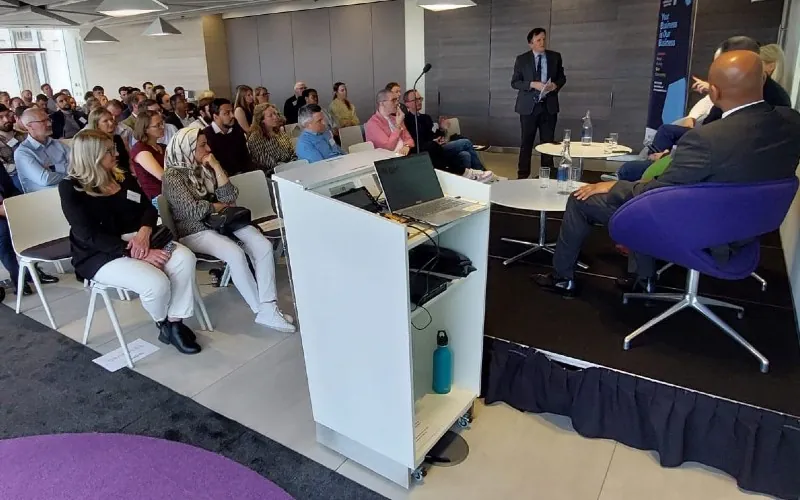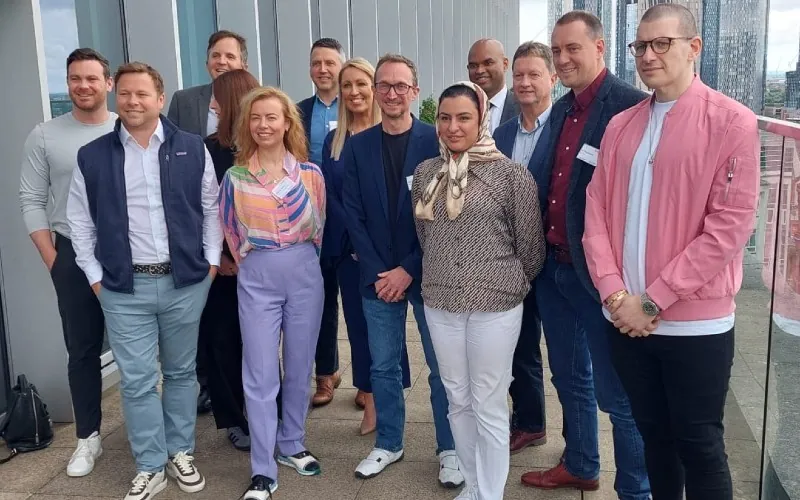Greater Manchester is outstripping the rest of the UK when it comes to growth and is the perfect place to do business.
That was one of the conclusions at the launch event of BusinessCloud’s GM 125 Rising Stars of Business list, in conjunction with GM Business Growth Hub.
KPMG’s Manchester office hosted Friday’s business event, which was attended by many of the businesses on the list and the 30-strong Ones to Watch list.
Both lists showcase of the region’s most exciting companies from four key sectors: GreenTech; digital, creative and tech; advanced manufacturing and materials; and life sciences.
Speaking after the event Janine Smith, director of GM Business Growth Hub, said: “A selection of the most exciting businesses in Greater Manchester were in the room. With Greater Manchester outstripping anywhere else in the UK for growth, that means they are some of the most exciting businesses in the country.
“But no company or place is an island, we have to work together. The panellists shared their stories, and I know we all came away feeling brighter and bolder about the future.
“GM Business Growth Hub is here to connect the dots for businesses, and make sure that every business across our city region has what they need to succeed and thrive.
“Today was a triumph, so let’s make sure we’re all pulling in the same direction to strengthen Greater Manchester’s economy and make it the place to do business in the UK.”
Greater Manchester is home to more than 170,000 businesses and Smith urged them to take advantage of the free package of support that is available.
Smith was one of 12 speakers at the event, which was attended by more than 100 delegates, including a group from the Department of Business and Trade.
Gareth Langley is the CEO of award-winning crowd gaming specialist Piing. The startup is already working with some of the biggest names in sport around the world but Langley admitted it had a challenge raising early stage investment.
Patrick Smith is the founder of cybersecurity startup Zally, which has raised £1.3m towards its target of £1.6m.
He said he was clear about his three objectives: Get rid of passwords; make a better internet; and build a unicorn.
Despite only being founded in 2022, Zally has been able to attract some heavyweights to its board, including 6point6 founder David Webb as chairman.
Holly Holland co-founded Financielle with her sister Laura Pomfret and the app has been downloaded 225,000 times in 188 countries.
The startup has grown to six staff and has raised £750,000 towards its target of £1m but Holland admitted being a B2C business was a harder sell to investors than a B2B.
Eleanor Harry is the CEO of tech for good startup HACE, which is on a mission to leverage technology to sustainably eradicate child labour in global supply chains.
The startup recently raised £450,000 in its pre-seed funding round, beating its initial target by 20 per cent, but Harry believed she was treated differently as a woman in tech.
Somayeh Taheri is the CEO of peer-to-peer (P2P) energy exchange Urban Chain, which has grown turnover to £24m with a pipeline of £100m.
Global investment firm Eurazeo backed Urban Chain and Taheri admitted most investment was centred in London.
Gary Brandwood is the managing director of Leigh-based solar energy company Perfect Sense Energy, which was founded in 2010.
The company has been completely bootstrapped and has grown turnover from £1m to £8m in the last three years.
Brandwood praised the help the company had received from the GM Business Growth Hub.
Mark Tibbenham is the former chairman and managing director of Rochdale-based GJD Manufacturing, which was sold in 2022.
He also highlighted the help his business had received from the GM Business Growth Hub, which was one of the reasons why he’d volunteered to become a local innovation connector at GM Business Growth.
Tibbenham grew GJD Manufacturing to a £7m turnover and said part of their success was the speed with which they responded to customer enquires.
Sean Brown is the CEO and founder of Versori, a provider of data infrastructure solutions.
He told the audience that he believed Versori had the potential to become a unicorn but said businesses shouldn’t be judged solely on the amount of money they make.
Brown said Greater Manchester should take a leaf out of San Francisco’s book and build closer links between VCs and universities.
Dr Vivek Koncherry is the CEO of Graphene Innovations Manchester, which connects graphene technology with business opportunities on a global scale.
Graphene was discovered in 2004 by Prof Andre Geim and Prof Kostya Novoselov at The University of Manchester and Koncherry said it had contributed to Manchester’s global reputation for advanced materials.
However, he said it was a lot harder to raise investment in Manchester than elsewhere in the world.
Ed Thompson is the CTO and co-founder of Manchester’s newest unicorn Matillion, which he co-founded with Matthew Scullion in 2011.
He said he was passionate about tech skills and education and was concerned that some early career roles could be swallowed up by the rise of AI.
The final speaker was Tom Pickersgill, who has just founded Deploi after his previous business – Orka Technology Group – went into administration.
He shared his experiences of what went wrong and urged anyone else going through a similar experience to reach out to him.
Asked what it was like when administrators were called in he said: “You feel like you’re in the stocks, it’s tough. We were very open with the team about some of the challenges that he had.
“Everyone was trying to do the right thing. Failure is part of the process of building a company.”


